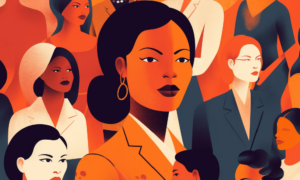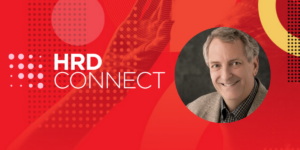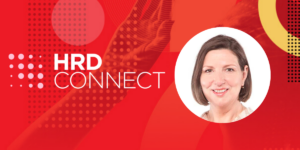Dave Ulrich on turning aspirations for impact into ideas for action
- 6 Min Read
HR thought leader Dave Ulrich outlines the methods organisations can follow to reach the potential of their HR strategies
- Author: Dave Ulrich
- Date published: Sep 27, 2021
- Categories
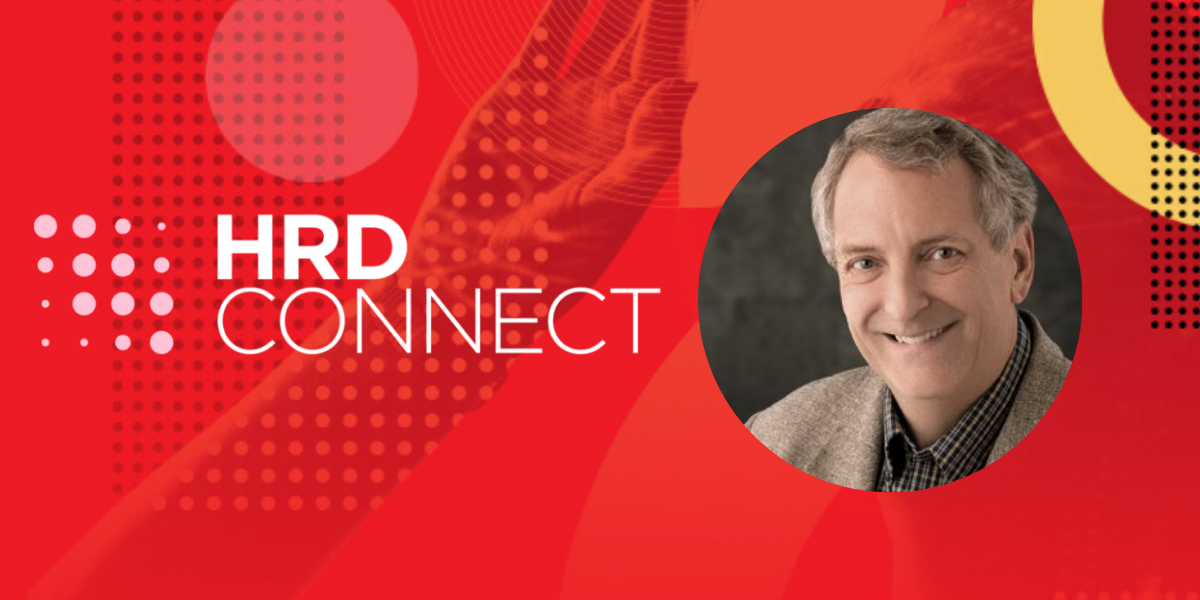
Most professionals inside and outside of HR recognise the increasing relevance of human capability in today’s demanding business context (see figure one):
Figure one: Calls for increased attention to human capability
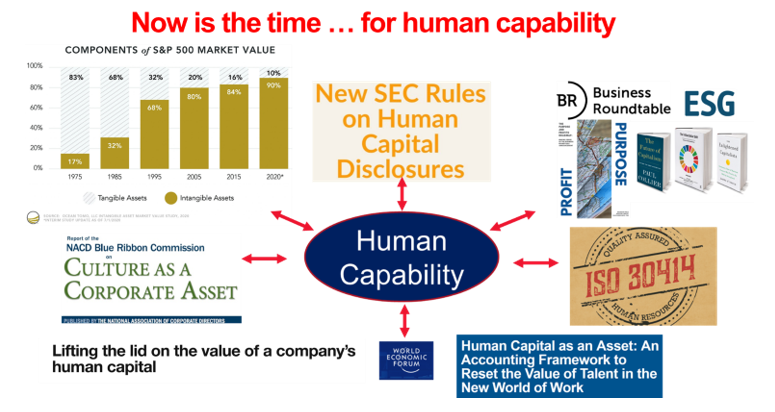
Frequently the challenge is to evolve recognition of HR’s relevance into resolve to do the right things. How do aspirations for impact turn into ideas for action?
Over the last 18 months, my colleagues and I have been involved with two major research projects on how HR can add value and rise to the opportunity within the current business context.
The HR Competence and Capability Study (HRC2S) is a 35-year study co-sponsored by Ross Executive Education at the University of Michigan and The RBL group, with partnership from 19 global HR associations.
In round eight (co-directed by Pat Wright, Mike Ulrich, and Erin Burns) with data from about 29,000 individuals in thousands of organisations, this research explores how HR competencies, HR departments, and business/organisation capabilities will deliver personal, stakeholder, and business results. It informs how an HR professional can be more effective.
The Organisation Guidance System (OGS) is a partnership between The RBL Group and CorpU. This study, with data from over 2,800 individuals in 1,200 organisations, defines four human capability pathways for HR’s contribution: talent, leadership, organisation, and HR. 37 specific initiatives are identified across the four pathways, and research shows which of those 37 initiatives delivers which of five results: employee well-being and productivity, strategic direction, customer commitment, financial performance, and social citizenship.
This study moves the HR field from a focus on benchmarking (how do we compare), best practices (whom can we learn from), and predictive analytics (what are others doing well) to guidance (what should we do to create value for our organisation). It informs business and HR leaders how to create a portfolio of human capability investments that deliver personalised stakeholder value.
While the two studies have different theoretical perspectives, methodologies, samples, and data analysis, they each demonstrate the value of analytics in defining how HR delivers value to all stakeholders. They focus on stakeholder results and not just HR actions; they partition out the key elements of human capability that impact desired results; they form a basis for turning aspirations into actions.
Clearly, these are not the only relevant studies in the human capability field (see incredible curation of HR thinking and research by David Green, Sian Harrington, Chris Rainey, Josh Bersin, and many others!), and both studies have limitations, but their similar results are worth exploring. Seeing themes will help us understand which actions are right for delivering on our aspirations.
HR is not about HR, but about delivering results to all stakeholders
In both studies, the focus is less on what HR does (individual competencies, HR department actions, human capability initiatives) and more on how stakeholders benefit from HR work. The stakeholders to human capability are both inside the organisation (employee and strategy) and outside (customer, investor, and community).
The implication is that HR professionals should align their work around stakeholder outcomes and not just actions.
Organisation capability matters more than individual competencies in delivering business results
Both studies compare the relative impact on stakeholders from individuals (called human capital, talent, competence, employees, workforce) and organisation (culture, capability, systems, workplace). In both studies, the “whole” (organisation) has greater impact than the “parts” (individual). While talent matters and is a key ingredient of HR related work, the ways that people work together in organisations matters even more for stakeholder results.
Likewise, an individual leader matters, but collective leadership in organisation matters more for results. Plus, an independent HR practice (like hiring, training, or compensation) matters, but the bundled practices (often called high-performing work systems) matter more. This is why the term “human capability” provides a broad blueprint for human (individual or human capital), capability (organisation or team), leadership, and HR work streams.
The implication is that HR professionals need to not only have exceptional personal competence, but they need to build effective HR departments and create the right organisation capabilities within the businesses where they work.
Some organisation capabilities have more impact than others
If organisation capabilities deliver more results than individual competencies, which capabilities seem to matter most?
In the OGS study (see figure two), we examined 12 organisation capabilities (rows) and their relative impact on five stakeholders (columns). The darker shades of green (higher impact scores) in each column indicate that with these 367 respondents, different organisation capabilities have a different impact depending on the stakeholder (for example, social citizenship, column G, is more affected by the organisation capability of social responsibility (number seven).
However, in general, the organisation capabilities that seem to deliver the greatest value across stakeholder outcomes are strategic clarity (number three), agility (number two), customer centricity (number four), culture (number five), and talent or human capability (number one).
In the HRC2S study, we had multiple respondents organised into 1,013 organisations. In figure three, we show ten organisation capabilities (rows) and five outcomes (columns). Like figure two, the shades of green in each column indicate which organisation capabilities have a higher impact on stakeholders.
What is fascinating is that a subset of capabilities emerge from both studies as critical to delivering value to many stakeholders.
- Talent or human capital: Our employees are highly skilled and considered the best in the industry.
- Culture: Our values and purpose drive our employees and attract customers.
- Agility: We quickly adapt our processes, products, services, etc. to meet changing demands.
- Social responsibility: We establish a strong reputation for sustainability, philanthropy, and employability in our industry and community.
The implication is that for many organisations, these are four capabilities HR professionals should target and help create to deliver value to key stakeholders.
Figure two: Organisation Guidance System (OGS)
Relative impact of organisation capabilities on five outcomes
(Each column C, D, E, F, and G partitions 100 points across twelve capabilities.)
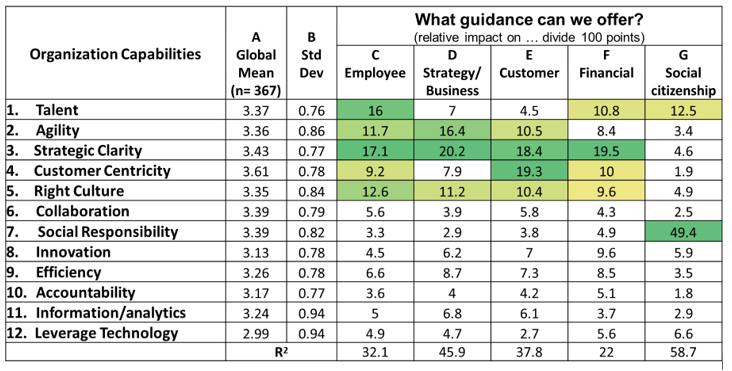
Figure three: HRC2S
Relative impact of organisation capabilities on five outcomes
(Each column C, D, E, F, and G partitions 100 points across ten capabilities.)
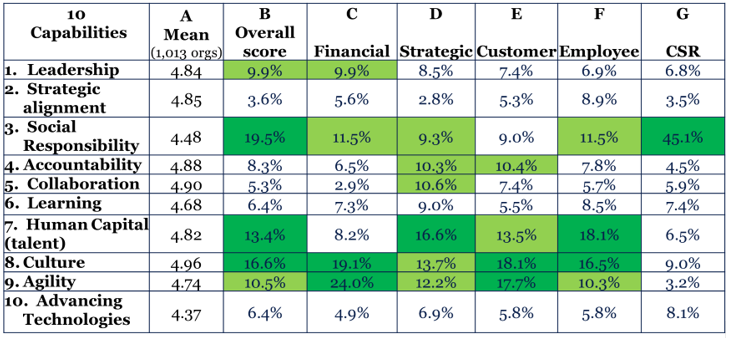
Using data to guide decisions is important
Both studies demonstrate how data provides information to guide decisions (like focusing on targeted capabilities described above). For example, HRC2S found that HR departments needed to establish policies and practices that increase employee competence and commitment to deliver stakeholder results.
The OGS research identified acquiring talent, communicating with employees, managing employee performance, and creating a positive employee experience as four (out of ten) employee practices that had the most impact on many stakeholders.
For another example, HRC2S found fostering collaboration as a key competence for effective HR professionals. Similarly, the OGS research identified building relationships within HR and between HR and others (business leaders, employees) as having a dramatic impact on stakeholder outcomes.
The implication is that HR professionals can and should rely on data to guide their decisions. This practice will ensure that the decisions they are making are the right ones to accomplish their aspirations.
So, how do you turn your aspirations for impact into ideas for action?




